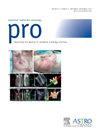FIGO 子宫内膜 2023 更适合放射肿瘤患者。
IF 3.4
3区 医学
Q2 ONCOLOGY
引用次数: 0
摘要
FIGO 2023 子宫内膜癌分期系统与 14 年前(2009 年)制定的分期系统相比发生了显著变化。新的分期系统首次纳入了非解剖因素(淋巴管间隙侵犯和组织学)和分子分类,这影响了早期疾病的分期(IAmPOLEmut 和 IICmp53abn)。这些变化的目的是:1)高精度预测患者的预后;2)识别不同的治疗相关亚组。自 2013 年 TGCA(癌症基因组图谱)结果公布以来,我们对子宫内膜癌生物学和自然病史的认识发生了翻天覆地的变化。2023 FIGO 分期系统协调并整合了解剖学、组织病理学和分子特征方面的新旧知识。此外,FIGO 2023 还具有不同的子分期,可改善辅助治疗决策。尽管对新分期系统的实用性存在争议,但我们推测 FIGO 2023 对旨在提供个性化治疗建议的放射肿瘤专家更有用。FIGO 2023 要求我们改变对分期系统的认识,从传统的以解剖边界为基础的系统转变为将解剖学和肿瘤生物学作为患者关键预后因素的分期系统,同时为治疗决策提供重要信息。本文章由计算机程序翻译,如有差异,请以英文原文为准。
International Federation of Gynecology and Obstetrics Endometrial 2023 Is Better For Radiation Oncology Patients
The International Federation of Gynecology and Obstetrics (FIGO) 2023 staging system for endometrial cancer has marked changes from the previous staging system instituted 14 years prior in 2009. The new staging system includes nonanatomic factors for the first time (lymphovascular space invasion and histology) and molecular classification, which impacts the stage in early-stage disease (IAmPOLEmut and IICmp53abn). The purpose of these changes was to provide (1) high accuracy in the predictive prognosis for patients and (2) identification of distinct treatment-relevant subgroups. Our understanding of the biology and natural history of endometrial cancer has undergone a radical transformation since the Cancer Genome Atlas results in 2013. The 2023 FIGO staging system harmonizes and integrates old and new knowledge on anatomic, histopathologic, and molecular features. Moreover, FIGO 2023 has distinct substages that improve adjuvant treatment decision making. Although the practicality of the new staging system has been debated, we postulate that FIGO 2023 is more useful for radiation oncologists aiming to provide personalized care recommendations. FIGO 2023 requires a change in our perception of a staging system, from a traditional anatomic borders-based system to a staging system integrating anatomy and tumor biology as pivotal prognostic factors for patients while providing important information for treatment decision making.
求助全文
通过发布文献求助,成功后即可免费获取论文全文。
去求助
来源期刊

Practical Radiation Oncology
Medicine-Radiology, Nuclear Medicine and Imaging
CiteScore
5.20
自引率
6.10%
发文量
177
审稿时长
34 days
期刊介绍:
The overarching mission of Practical Radiation Oncology is to improve the quality of radiation oncology practice. PRO''s purpose is to document the state of current practice, providing background for those in training and continuing education for practitioners, through discussion and illustration of new techniques, evaluation of current practices, and publication of case reports. PRO strives to provide its readers content that emphasizes knowledge "with a purpose." The content of PRO includes:
Original articles focusing on patient safety, quality measurement, or quality improvement initiatives
Original articles focusing on imaging, contouring, target delineation, simulation, treatment planning, immobilization, organ motion, and other practical issues
ASTRO guidelines, position papers, and consensus statements
Essays that highlight enriching personal experiences in caring for cancer patients and their families.
 求助内容:
求助内容: 应助结果提醒方式:
应助结果提醒方式:


